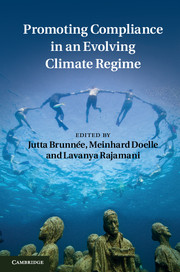Book contents
- Frontmatter
- Contents
- Contributors
- Preface
- Abbreviations
- Introduction: The role of compliance in an evolving climate regime
- Part I Context
- Part II The Kyoto compliance system: Features and experience
- Part III Compliance and the climate regime: Issues, options, and challenges
- Part IV A look forward
- Bibliography
- Index
Preface
Published online by Cambridge University Press: 05 January 2012
- Frontmatter
- Contents
- Contributors
- Preface
- Abbreviations
- Introduction: The role of compliance in an evolving climate regime
- Part I Context
- Part II The Kyoto compliance system: Features and experience
- Part III Compliance and the climate regime: Issues, options, and challenges
- Part IV A look forward
- Bibliography
- Index
Summary
Preface
Our work on this volume began in 2008. At the time, like many other observers of the UN climate change regime, we were optimistic that the 2009 Copenhagen meetings would produce at least the basic framework of a post-2012 regime. We embarked on a book project that was intended to provide a comprehensive assessment of the climate regime’s existing compliance system, and an authoritative guide to the new elements of the system, which we were hoping would emerge from the Copenhagen meetings. We were not alone in our optimism about the future trajectory of the climate regime. In a remarkably short time we were able to assemble a first-rate group of authors, comprising leading scholars and practitioners with close knowledge of the climate regime. Our authors enthusiastically committed to a tight writing schedule, designed to produce a complete book manuscript within a few weeks of the Copenhagen meetings.
The rest is history, as the saying goes. It became clear in the summer and autumn of 2009 that Copenhagen was unlikely to produce the much anticipated breakthrough. Indeed, ‘Copenhagen’ has since come to be associated with fundamental shifts in the structure and approach of the global climate regime. The Copenhagen Accord, a non-binding policy instrument cobbled together in the dying hours of the meetings, signalled a departure from the prescriptive, internationally negotiated commitments and oversight mechanisms that had characterized the UN Framework Convention on Climate Change and its Kyoto Protocol and, indeed, the majority of multilateral environmental agreements. Instead of this centralized approach, the Copenhagen Accord heralded decentralization – a shift toward non-binding, self-selected, and nationally or regionally supervised commitments.
- Type
- Chapter
- Information
- Promoting Compliance in an Evolving Climate Regime , pp. xi - xiiPublisher: Cambridge University PressPrint publication year: 2011



